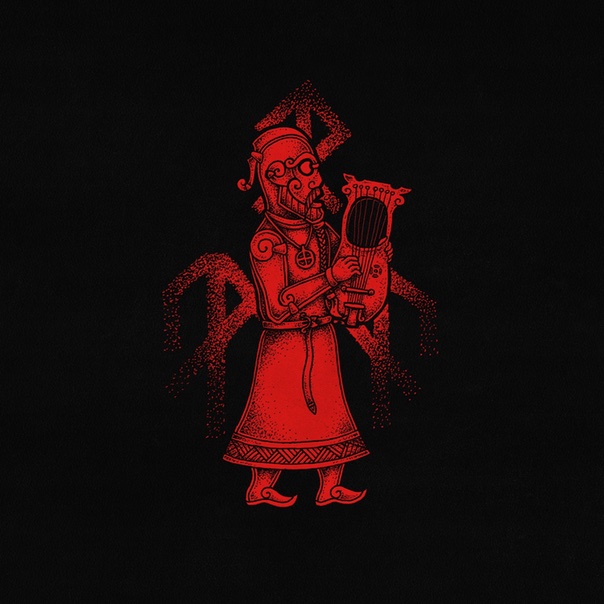ALBUM REVIEW: Wardruna distills Old Norse poetry with ‘Skald’
Skaldic poetry largely defined the rhetoric and literature of the Viking age, making the Skalds of ancient Scandanavia powerful forces of culture, religion and catharsis in pre-Christian Scandinavia. It’s hard to think of a more appropriate heir to the Skaldic mantle than Norway’s traditional folk collective Wardruna. The act’s fourth LP, Skald strips its usually expensive sonics down to bare essentials in earnest reference to an obscure tradition.
Skald
Wardruna
By Norse Records, Nov. 23
After composing the score for the History Channel’s Vikings and completing a trilogy of albums inspired by the ancient Germanic runic alphabet Elder Futhark, Wardruna now forgoes massive soundscapes in favor of 10 solo live recordings. Armed with a kraviklyre, a tagelharpa, a bukkehorn and his own voice, frontman Einar Selvik delves into Viking poetry for an impressive bounty.
Bukkehorn blasts provide a druidic aura for opener “Vardlokk (Summoning Guardians),” but its second is only haunting vocal drones. While it might seem like an oxymoron to call a half-a-capella song “instrumental,” Selvik uses his full-bodied voice as an instrument in the truest sense.
The limited range of his lyre and bowed instruments necessitate expressive singing, as evidenced on the minimalist lyre plucking on the title track. His gruff, emotive vocal timbre effectively fills in the dead space left by the strings’ quick decay. While the lyrics are primarily sung in Old Norse, the weightiness and confidence of his rapturous performances transcend language barriers with ease.
The nimble lyre arpeggiations in “Ein sat hon uti (Along She Sat Outside)” are sparse and repetitious. While its foray into tagelharpa certainly sports more resonance, “Vindavla” is still based in open voicings and hypnotic modulations. In this sense Selvik’s voice becomes the necessary focal point of Skald. He provides dynamism to otherwise sparse arrangements, as the inherent imperfections of his unedited performances provide believable authenticity.
The “Skaldic versions” of three pre-existing Wardruna tracks “Voluspá,” “Fehu” and “Helvegen” encapsulate the contrast between Skald and Wardruna’s previous material. The stark minimalism of this album cannot be stressed enough. It’s just Selvic in a room with three instruments playing Nordic folk incredibly well.
The musical fundamentals of these three songs remain intact even without the grandiosity provided by the full band. Descending minor chords, choppy accents and swaying balladry respectively evoke a grizzled longboat-man warming his spirit amid the icy Nordic winds. Selvik’s impassioned singing and steadfast playing elevate these cuts from Viking campfire songs to stunning displays of melodic viscera.
Skald revolves around simple ideas, and the ideas’ success depends on how well Selvik can capture the essence of the ancient poems he chose. “Ormagardskvedi” (Snake Pit Poetry), highlights three stanzas from the Icelandic work “Ragnars Saga Loðbrókar.” Even without the context of legendary Viking hero Ragnar Lodbrok’s unceremonious execution-by-snake-pit, Selvik perfectly contextualizes his words to a sobering rumination on the universal nature of death.
As he unearths the poetry of Nordic warriors, Selvik does charge these cuts with his genuine musicality. This is most apparent on “Gravbakkjen” (The Burial Hill). Selvik had to add his own music and words to the lost swan-song of Petter Strømsing, who apparently wrote it for performance at his funeral. This freedom allows him to push lyre and voice to dumbfounding heights.
The plodding lyre plucks of “Gravbakkjen” carry a heavy melancholy, but there’s still room for hope in fatalistic tune, as read in the translated lyrics: “When I eventually lie in the ground/ Still I will live in the words/ Of the verses that I chant and the tunes which carry.” In this way, Selvik’s background in Norwegian black metal comes full circle.
His old band Gorgoroth nursed an obsession with archaic Norse culture underneath anti-Christian blasphemy, and Skald sees him fully partake in the Nordic traditions he at first preserved through rampaging drums and shredding guitars. It may seem worlds away from black metal, but Selvik’s pure fervor gives these delicate notes an impact on par with the extreme metal he came up with.
The 15-minute a capella cut “Sonatorrek” stresses the need for patience and open-mindedness to properly appreciate Skald. The song leaves evolving arrangements on shore, sailing away with primitive chanting. Selvik’s intent here is more spiritual than musically involved, as he thanks Odin for having bestowed on him the skaldic art. Indeed, Skald feels just as much like ancestral reverence as a collection of folk tunes. It’s a suitably interesting listen, but understanding Selvik’s larger point gives it much more staying power.
Wardruna has long evoked Viking tales with cinematic ambiance, but Skald reaches into the core of Nordic folk music to resurrect in all their arcane glory. Selvik not only do these ancient Nordic songs justice in a musical sense, but taps into the timeless intent behind the words of his ancestors.
Follow editor Max Heilman at Twitter.com/madmaxx1995 and Instagram.com/maxlikessound.
This review has been changed to reflect that the Skalds originated in Scandinavia and that Wardruna primarily sings in ancient Norse.

